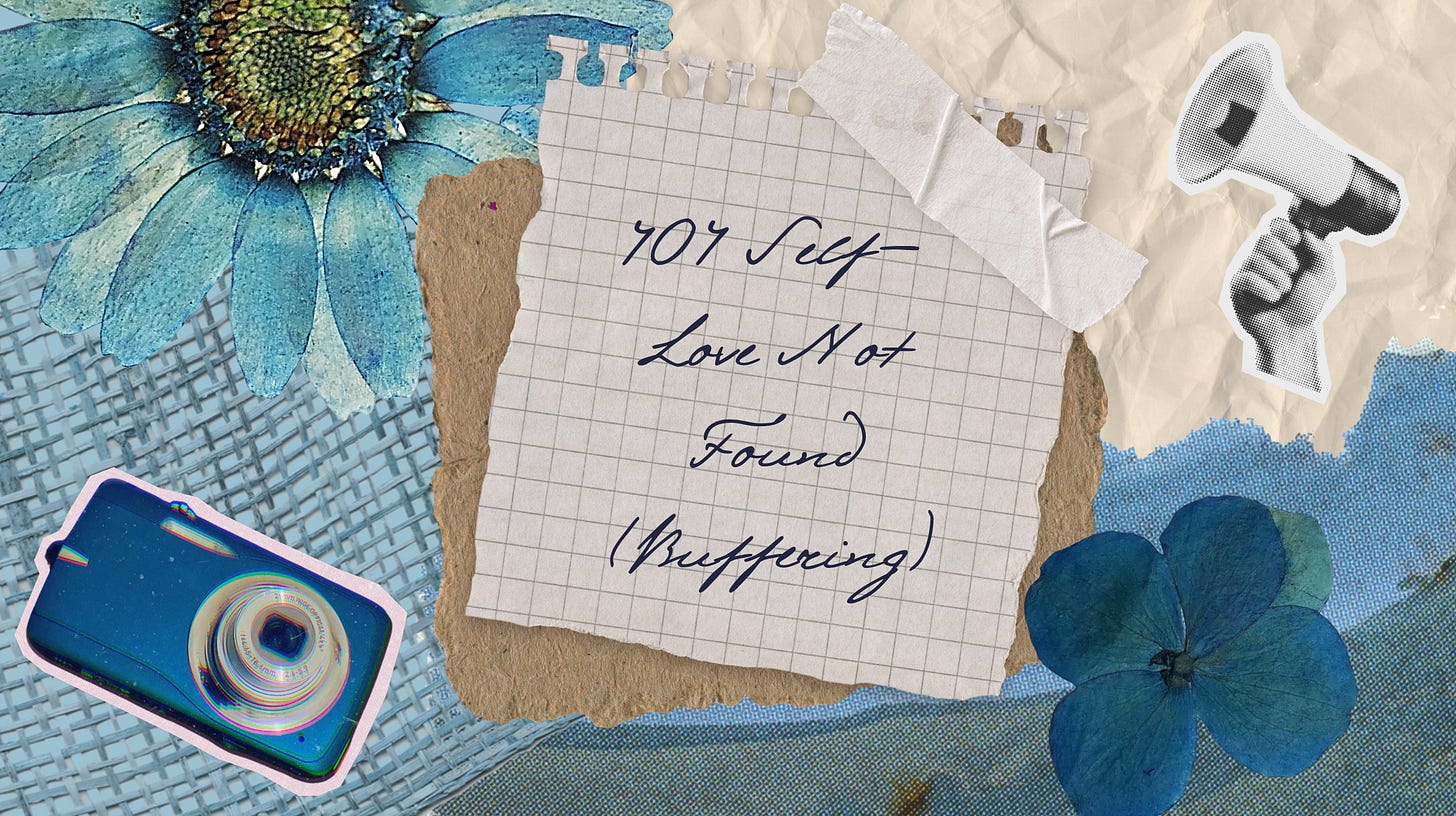There's something peculiar about the way we talk to ourselves. A private language of critique, each thought a perfectly crafted weapon designed to hit exactly where it hurts most. Walking past a store window this morning, I did it again—that instinctive inventory of flaws, that automatic accounting of every perceived failure.
I know my soul.
She's beautiful and wild and full of starlight. But this body, this human container, this collection of choices and consequences? Some days I can barely look at her without cringing.
Maybe you know what I mean. The way you can simultaneously hold the deepest love for your essence while waging daily war with your existence. How you can recognize your infinite worth in one breath and list all your shortcomings in the next.
The spaces between loving and loathing
Some nights, when the world gets quiet and my guard comes down, I feel it—that deep, soul-level knowing of my own worth. The part of me that exists beyond bodies and bank accounts and Instagram grids. She's magnificent, that version of me. Unlimited. Unafraid. Unbound by all these human metrics of enough.
But morning comes, and with it, all the ways I've learned to make myself small.
I keep trying to understand how both versions can be true.
The archaeology of old wounds
Do you ever notice how certain memories stick to your skin like burrs? Little moments you should have forgotten years ago, but somehow they've become part of your daily uniform.
That time in third grade when someone laughed at your lunch. The middle school dance where your dress was wrong. The job interview where you talked too much. The date where you weren't enough.
Each one a tiny shard of evidence you've collected, carefully cataloged, filed away as proof of your own unworthiness.
God, we're thorough when it comes to documenting our failures.
The art of gentle rebellion
Here's what no one tells you about learning to be kind to yourself: it feels fake at first. Like trying to write with your non-dominant hand. Clumsy. Uncomfortable. Wrong.
The critical voice in your head has had years—perhaps decades—to perfect its arguments against you. Of course kindness feels strange in comparison. Of course gentleness seems suspicious. You've been trained to distrust it.
Start small. Replace "I'm so stupid" with "I made a mistake." Substitute "I'm a failure" with "This attempt didn't work." Notice the difference between judging your entire being versus acknowledging a single moment or action.
When everything feels hard
The truth is, some days you won't be able to do any of this. Some days the voice of criticism will be too loud, too convincing, too familiar to ignore. Some days you'll believe every mean thing your mind whispers.
On those days, remember this: you don't have to love yourself to be worthy of love. You don't have to fix yourself to deserve kindness. Your soul knows your worth, even when your mind forgets.
The hardest truth? Sometimes just existing is enough of an act of rebellion. In a world that demands productivity, perfection, and perpetual improvement, simply honoring your humanity—your needs, limitations, and innate value—becomes a radical stance.
Notes on survival and other impossible things
How do we practice this rebellion in real life? How do we measure progress in a journey with no clear destination? I've started keeping a list:
The way sunlight feels on bare shoulders
How my coffee tastes at 6am, before the world gets loud
The small victory of sending an email without apologizing
The moment before sleep when I forget to hate myself
The days when I manage to be gentle, even for a minute
The times I catch myself smiling in mirrors instead of critiquing
Small things. Tiny moments of accidental self-kindness. These aren't grand gestures or permanent transformations—they're fleeting instances when the weight lifts briefly, when the critical voice quiets enough for me to hear something else. Something truer.
These notes on survival have become breadcrumbs leading back to myself. Evidence that another way of being is possible, even when it feels impossible.
The language of trying again
I'm learning a new vocabulary for the days when self-love feels impossible. Words like "enough" and "worthy" and "becoming." Small words that hold space for both who I am and who I'm learning to be.
It's not always pretty. Sometimes it's just getting through the day without being mean to myself. Sometimes it's just saying "maybe tomorrow I'll do better" instead of "I always mess everything up."
The quiet practice of becoming
Maybe that's what self-kindness really is—not some grand transformation into permanent self-love, but these tiny moments of choosing gentleness over judgment. Of treating ourselves with the same grace we'd offer a friend.
I'm learning to let both versions of me exist: the soul who knows her worth and the self who sometimes forgets. They're both real. They're both true. They're both worthy of kindness.
Even when everything feels hard.




I love the both/and aspect. Because we can't learn how to be kind to ourselves without also being kind to the parts of ourselves who have to been that we're bad. That part of us needs love and compassion, too, and so much of "self-help" is about hating on or cutting off that part of ourselves.
This is so insightful! I'm currently pregnant with my first child, a baby girl. Anytime I face a dilemma where I'm tearing myself down over something that isn't that big of a deal - it's helped to think "what would I say to this baby girl", and extend myself the same love and kindness.